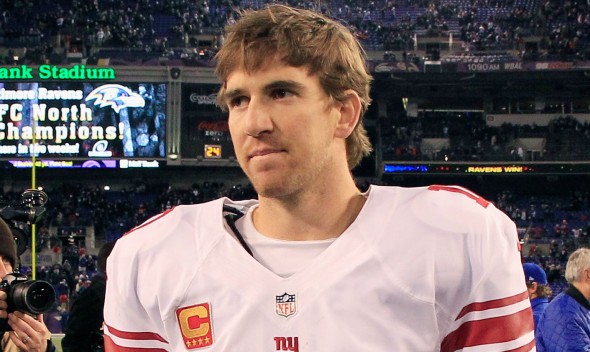The New York Giants are 0-4 for the first time since a strike-shortened 1987 season that featured replacement players for the first few games. This year’s team has been a disaster since Week 1 and it has gotten worse every week thereafter.
One of the greatest causes of this calamitous start is the awful play of the offensive line and its inability to keep quarterback Eli Manning off his back. Injuries have taken their toll, but there is an obvious lack of talent along the offensive line.
The Giants have made strides to improve Manning’s chances of passing the football without getting hit. Against the Kansas City Chiefs, they rolled him out and called quicker pass plays to get the football out of his hands sooner. But more must be done to alleviate the pressure on him so that the passing attack is successful. That rests on the shoulders of both the players and the coaching staff.
The blame cannot lie entirely with the offensive line, however.
Offensive coordinator Kevin Gilbride has arrogantly stuck to doing what he has always done and, as a result, the Giants depend too much on big plays down the field from wide out Victor Cruz for any kind of points. With Manning facing as much pressure as he is, this will clearly continue to fail.
Manning is the fifth-most pressured quarterback, having been placed under pressure during 43.5 percent of 168 drop-backs, according to Pro Football Focus. His underrated elusiveness in the pocket has allowed him to be sacked just 19.2 percent of the time, but the pressure has taken an obvious toll on his passing ability. When under duress, the New York gunslinger has completed 44.6 percent of his pass attempts — 10th-worst in the NFL. Given the circumstances, this would be understandable if Manning was a youngster. But, of those ranked behind him, only two (Michael Vick and Carson Palmer) have played more than four years in the league.
Much of that can be credited to consistent pressure from opposing defenses… with not just one player in his face moments after the snap, but multiple players on most downs. It doesn’t matter who is behind center — not big brother Peyton, Tom Brady or Drew Brees — no quarterback is going to be able play well in that situation.
The Giants need to speed things up on offense, especially in the passing game. Less posts, outs and streaks down the middle of the field. More quick slants and screens to Cruz and Hakeem Nicks.
Everyone knows how quickly the Eagles’ offense moves down the field… nobody’s asking for that. But New York must do things differently to ensure the football gets out of Manning’s hands and down the field.
Pro Football Focus says that Manning takes more time than 19 of 32 starting quarterbacks to throw the football. That’s not a product of Manning taking too long in the pocket, it’s a combination of bad play calls and him running for his life. Of the league’s best-rated passers, the top four (Peyton, Philip Rivers, Aaron Rodgers and Tony Romo) rank within the top 10 in the average time they take to throw the ball.
As they make these necessary adjustments, the other stuff — the big plays down the field as well as the rushing attack — will open up. And suddenly, the Giants’ offense could look like the top unit it was predicted to be.
They have too many offensive weapons to waste them with their QB’s face in the turf. Gilbride, Manning and the Giants have to get the football to that arsenal so that they can make things happen. And as they do, they can slowly work some of their old, reliable, offensive plays back into the rotation.
Louis Musto is a reporter and sports talk host for the Sports Journey Broadcast Network. He is a member of the Pro Football Writers of America. All quotes were acquired first hand or via team press releases unless otherwise noted. You can follow him on Twitter @LouisMusto.


